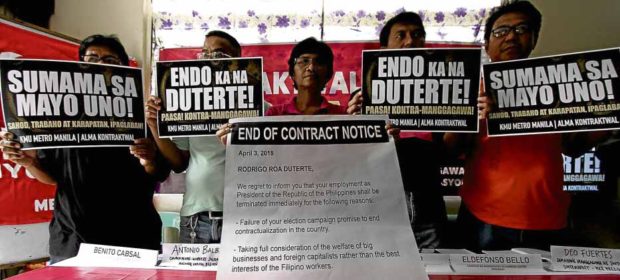No EO ending ‘endo’ on Labor Day – Palace

Labor activists issue an end of contract notice to President Duterte for the government’s failure to end contractualization during a press conference early this month. —RICHARD A. REYES
After much hemming and hawing, President Duterte will not sign an executive order (EO) on labor contractualization, after all.
The President will just leave it to Congress to deal with the practice of “endo,” or end of contract, a contractualization scheme that workers’ groups have been protesting for many years, his spokesperson Harry Roque said on Thursday.
Labor groups had expected the issuance of the order ending endo, the employers’ practice of terminating employees before six months to avoid making them regular workers and paying them benefits.
Contractualization offers no security of tenure, which employers use to avoid regularizing workers to save on costs.
Labor groups condemned the President’s decision to forgo the signing of an EO and end contractualization as he had promised during his campaign for the presidency.
Article continues after this advertisementHe was supposed to sign an order that a coalition of labor groups prepared in consultation with Labor Secretary Silvestre Bello III on Monday, when he was scheduled to meet with them in Malacañang.
Article continues after this advertisementRoque announced on Monday the cancellation of the meeting but said the President would sign an EO on or before Labor Day.
He surmised that the aborted meeting was a result of the failure of workers, management and the government to agree on the final version of the EO.
Certified as urgent
In a press briefing on Thursday, Bello said the President would instead certify as urgent a Senate bill on security of tenure.
“We had a meeting last Friday with Executive Secretary Salvador Medialdea and after going through the three proposed EOs to be signed by the President, the consensus was that he will instead certify as priority the bill that is now pending in the Senate on the security of tenure,” Bello said.
Three draft EOs, all tackling contractualization, were submitted to the Office of the President, he said.
“One draft proposes a total prohibition; another draft proposes a regulation of contractual arrangement; and another draft basically has the same effect but labor and management could not agree on the use of the term ‘principal’ employer,” he said.
The labor sector prepared a draft EO on the request of the President. Employers’ groups and the Department of Trade and Industry came up with another draft.
Business groups were against the labor sector’s draft, saying it would make direct hiring the general norm in employment relations. This would scare off investors, they said.
Change of mind
Bello said the President could have changed his mind on his commitment to issue the order due to the redundancy of an EO and Department Order No. 174 that the labor department issued.
DO No. 174 addresses unlawful contractualization “if there is an effective and honest-to-goodness implementation of the order,” he said.
By asking Congress to pass a bill on contractualization, the “President has succumbed to the pressure and will of business,” said Julius Cainglet, vice president for research, advocacy and partnerships of the Federation of Free Workers.
“Because he can’t stand up to [groups] like the Employers Confederation of the Philippines, he is now passing the buck to Congress,” said Josua Mata, secretary general of Sentro ng mga Nagkakaisa at Progresibong Manggagawa.
Partido Manggagawa chair Rene Magtubo said “the President has effectively reneged [on] his campaign promise.”
In a press briefing, Roque said: “Although we were all looking forward to the EO, an EO can only do so much. As you know, in our system of government, the executive through an EO can only implement the law.”
“So there has to be a revision of the law, especially on the definition of what endo is,” he said.
“It has to be Congress,” he added.
House bill approved
In January, the House of Representatives approved on final reading a bill that would legalize contractual labor if allowed by the labor department.
The measure seeks to require employers to regularize a contractual worker who has rendered six months of service, regardless of whether the job was deemed necessary.
It also states that probationary workers fired before six months are entitled to termination pay equivalent to a half-month salary per month of service.
The Senate has yet to pass a similar measure on endo.
Senate President Aquilino Pimentel III said Congress would have to confer with Bello or maybe hold another Legislative-Executive Advisory Development Council meeting to ask what the executive branch wanted “captured by law.”
Sen. Joel Villanueva, chair of the Senate labor, employment and human resources development committee, said the panel had prepared a draft report on the endo measure, which was being circulated to members for comments.
Villanueva said one of the most contentious provisions in the bill was defining labor-only contracting.
Bello expressed optimism that the proposed measure on security of tenure could be approved within the year.
In spite of the President not signing an EO, Bello said workers should watch for President Duterte’s speech on Labor Day for a possible “dramatic issuance.”